Cultural Resources
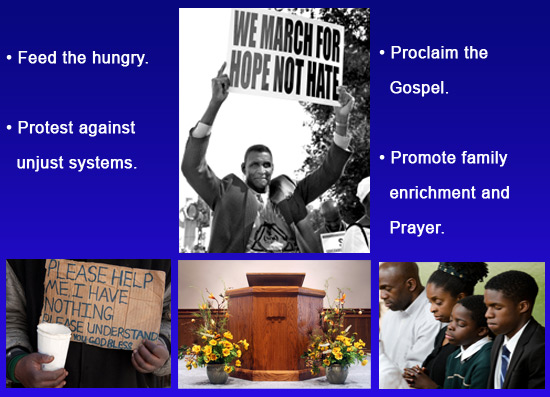
MISSION SUNDAY (MISSION WORK AT HOME)
CULTURAL RESOURCES
Sunday, July 8, 2012
Calvin C. Barlow, Jr., Guest Cultural Resource Commentator
Pastor, teacher, author, and publisher
I. Introduction: Scripture Background
In Matthew 10:5, 7-15, Jesus is in the region of Galilee. The sending of the disciples to the mission field is best viewed through the lens of Matthew chapter 9, verses 35 through 38. Jesus sends his disciples to the Jewish people for redemptive purposes and duplication of his work. He gives the disciples four directives: they are to heal the sick, raise the dead, cleanse the lepers, and drive out demonic spirits. In light of their assignment, several needs are obvious:
- They are to provide a medical fiduciary system for the disadvantaged and under-insured population;
- They are to provide a trauma center for the dead of their society;
- They are to offer a cleansing apparatus for those who have been alienated from society due the contagiousness of their disease; and
- They are to engage in a battle for the captive minds of the populous.
If these imperatives are eschatological only, a dawning of the messianic age, they are sign gifts given to Jesus’ chosen apostles. Therefore, the supernatural power and mission is viewed as being limited in scope and temporary. However, if the imperatives are timeless instructions, they are figurative instructions serving as a catalyst for spiritual realizations for producing a tangible impact upon humanity.
Whatever the nature of the imperative, the facts are obvious: Jesus sends his disciples to the sick, the hopeless, the quarantined, and the mentally disturbed. His instructions for the disciples to go to the Jews and not the Gentiles are non-discriminatory instructions and are consistent with Jesus’ worldview for mission and evangelism—mission starts at home and spreads abroad (Acts 1:12). Thus, the interpretation of the narrative has direct impact upon the scope and possibilities for mission in each generation.
II. Mission
Definition of Mission
A ministry commissioned by a religious organization to propagate its faith or carry on humanitarian work.1
Origin of Mission
Mission is the source of healing and it can be tangible or intangible. In other words, mission can be humanitarian or evangelistic. The early Christian church demonstrates the need for mission in its infancy (Acts 2:37-47; 4:34-35; 6:1-6). The concept of mission as practiced today takes its cue from Paul’s missionary journeys (Acts 13–21).
Etymology of Mission
The French word “mission” comes from the Latin word “mission,” which mean mission, sending, or dismissal. The Late Latin word “missus” means messenger, legate, sending, dispatch, or shooting. The Late Latin is derived from the Medieval Latin word “mittere,” which means to send, throw, or hurl. The first known usage of the word dates back to the 14th century.
The English word “mission” comes from Old French. The first known usage of the word dates back to the 16th century.2
III. Mission Images
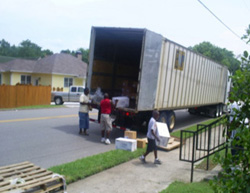 Members of Second Missionary Baptist Church unloading a truck for victims of the 2010 Nashville flood. Reverend C. C. Barlow, Jr., Pastor |
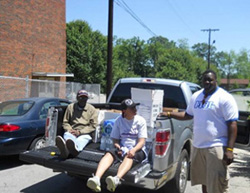 Members of Mt. Moriah Missionary Baptist Church of Pratt City, Alabama delivering supplies to victims of the Pratt City tornado of April 2011. Reverend Bernard Williams, Pastor |
|
IV. Twenty-first Century Mission Work at Home Davidson County has a nightly average of 219 homeless families. This number does not include persons that need food assistance. To meet these needs, Pastor Raymond Bowman and the Spruce Street Church developed a Home Mission Ministry that includes shelter for the disabled and seniors and a feeding program for the homeless and disadvantaged. The congregation is not large and the median age of its member is 55. Accordingly, the church inventoried its resources and assets and then began partnering with other churches, organizations, and individual donors to create ongoing ministries for the homeless and the poor. One of the largest is its feeding ministry. |
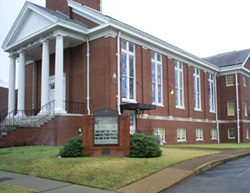 |
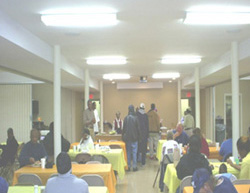 |
The feeding ministry is a part of a larger group initiative. The church adopted the mission of a larger initiative (The Love Kitchen), with which it partnered and found ways to participate in the initiative. The feeding ministry efforts of Spruce Street is an outreach of the seniors of Spruce Street. Each Tuesday they feed an average of 40 people. Because the church is located in a commercial district, the church uses its van to transport homeless and disadvantaged persons so that they can obtain meals. In addition to providing transportation, the church advertises its services to other agencies and facilities services for others who serve the homeless and disadvantaged of Nashville. |
Spruce Street Baptist Church of Nashville provides key points to small and mid-size churches and who want to do Home Mission initiatives. They are:
- Identify needs before creating a ministry;
- Identify other initiatives with which your church can establish meaningful partnerships;
- Identify internal resources and external accessible resources for capacity building;
- Identify internal capacity and those who have a passion for a mission ministry;
- Do not limit the scope of a mission ministry to only those inside your church;
- Know that the success of a mission ministry is not based upon the size of a congregation— rather it is conviction, commitment, and leveraging of resources that lead to success; and
- Continuously promote the mission ministry, its needs, and the transformational impact that it has upon those who are served and the community.
V. Twenty-First Century Home Mission Opportunities
  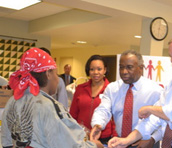 |
Jesus said, “The harvest is plentiful but the labors are few.” This statement is true in each generation. While the reasons for the lack of laborers may be different now than in the days of Jesus, all can agree that it is a missed opportunity to serve the least of these in ways that the Savior has commanded. Each generation has the responsibility to address the needs of its time. As the clock quickly ticks past the first decade of the twenty-first century, there is so much work that needs to be done in our communities. Our community needs more than once-a-month clothing pantries and persons who visit jails to pass out tracts. It needs more than churches who hand out baskets on Thanksgivingand backpacks at the start of the school year. It needs more than churches who annually hold lavish anniversaries for one group or person or another and reach out to provide assistance only to its own members. Yes, such initiatives help, but they barely scratch the surface. As Spruce Street has shown us, a small or a mid-size church with a pastor who makes mission work at home a priority can do a great deal to serve the poor and the marginalized. If your church is not doing enough, NOW is the time to begin new mission initiatives and to set new priorities. When Christ returns, excuses will not be accepted. Consider the following needs of African Americans and others in communities around the country and determine how your church can do mission work that has a great impact. |

The out-of-control imprisonment rate in our communities provides a common-sense mission opportunity for almost all black churches. Thousands of groups around the country work with those who are incarcerated and those who have been released. Your church can begin a new program, or better yet, collaborate with existing programs in your community to impact this problem. Your state and local government also has programs with which you can partner. Do not reinvent the wheel; use the web to find churches who are doing what you want to do. You may want to takes parts of several programs to create the mission program that best suits your church and will best serve your community. As we learned from Spruce Street Church, you do not need a lot of money or a large congregation, but you do need a pastor committed to mission and in this case to those in prison, which the Bible tells us Jesus was concerned about.

Mission Project: Education Interventions. Given that so much negative behavior by children and adults is linked to poor education or a lack of education, education projects leap forward as obvious twenty-first century mission projects for black churches. Such mission projects should of course be done in collaboration with teachers and others in your community who educate children.
Avoid setting up a room of computers for children and not ensuring that good mentors and teachers are there to aid them. Perhaps your church lacks space to establish an education project. That just means that your members need to go where the action is. Go to local schools and organizations (boys clubs, girls clubs, etc.,) and work with children there. Teachers and school officials are overwhelmed everywhere. What if your church worked with educators to train an army of community educational aides! What child wouldn’t benefit from just seeing the faces of a strong black male who is concerned about their education?
 |
For the most part, it is easier to train a child than a teenager or an adult. However given the vast number of adults in our community who cannot gain stable and well-paying employment due to having only a high school diploma or less, at this juncture in history the black church must step up to fill the void! Therefore, church educational and entrepreneurship ministries should target young adults and middle-aged adults. The church can participate in job fairs and other ministries that help persons find employment and/or start a business. The church can create résumé templates. It can serve as a free location for programs (such as Project Read) that teach adults to read and do everyday tasks that are necessary for people to move past illiteracy. Mission is an action that helps or creates relief (short-term or long-term) for persons and communities in need. |
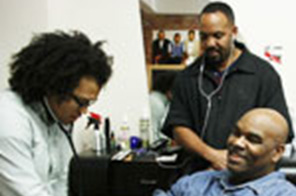 |
 |
Mission Project: Health Education and Onsite Services. Health disparities are wreaking havoc on the poor and the socially disadvantaged of our communities. Thus, it is imperative that the church develop means to address our health epidemic through ministries that create just policies and help people gain medical relief. Does your community need neighborhood health clinics for seniors and children? Are large numbers of black men and women in your community untested for HIV/AIDS? Can your church at least get the word out to help save lives? Why not collaborate with sister churches and local media to get the word out? Can your church bring in dieticians, nutritionists, doctors, and nurses and offer monthly seminars and low-cost medical services for those who cannot afford medical care and have unhealthy health lifestyles? Could you offer church space for health services and write grants to have corporations help pay for such a program? If you cannot do it alone, are there churches and health agencies that will collaborate with you? Whatever your church can do it must do. Too many in our community are needlessly dying early or are sick and unhealthy unnecessarily.
Let us focus on Jesus’ call for more laborers in his vineyard. That which we can do, we must do. We will not know what we can do unless we try. Mission begins at home, and our communities are counting on the black church.
VI. Mission Songs
All Nations
All nations shall come and worship;
shall come and worship You Lord.
All nations shall come and worship;
shall come and worship You.
For You are great and mighty, Lord, You are God alone;
You gather the nations together to worship at Your throne.
Bridge:
All nations, all nations
shall worship You. (repeat)4
Asleep in the Light
Do you see, do you see all the people sinking down?
Don’t you care, don’t you care, are you gonna let them drown?
How can you be so numb, not to care if they come?
You close your eyes and pretend the job’s done.
Bless me Lord, bless me Lord, you know it’s all I ever hear,
No one aches, no one hurts, no one even sheds one tear,
But He cries, He weeps, He bleeds, and He cares for your needs,
And you just lay back and keep soaking it in.
Oh, can’t you see it’s such a sin? ‘Cause He brings people to your door,
And you turn them away, as you smile and say,
God bless you, be at peace, and all Heaven just weeps,
‘Cause Jesus came to your door, you’ve left Him out on the streets.
Open up, open up, and give yourself away,
You see the need, you hear the cries, so how can you delay?
God’s calling and you’re the one, but like Jonah you run,
He’s told you to speak, but you keep holding it in,
Can’t you see it’s such a sin?
The world is sleeping in the dark, that the church can’t fight
‘Cause it’s asleep in the light,
How can you be so dead, when you’ve been so well fed?
Jesus rose from the grave and you, you can’t even get out of bed.
Jesus rose from the dead, come on, get out of your bed.
How can you be so numb, not to care if they come,
You close your eyes and pretend the job’s done,
You close your eyes and pretend the job’s done,
Don’t close your eyes, don’t pretend the job’s done….5
VII. Reference Websites
http://en.wikipedia.org/wiki/Education
http://en.wikipedia.org/wiki/Health_care
http://en.wikipedia.org/wiki/HIV/AIDS
Giving
http://library.generousgiving.org/page.asp?sec=28&page=22
http://www.mlive.com/living/grand-rapids/index.ssf/2010/10/study_reveals_church_giving
Prison Population
http://www.ask.com/wiki/Incarceration_in_the_United_States#Women
http://www.ask.com/wiki/Incarceration_in_the_United_States#Minorities
Notes
1. Online location: www.Merriam-Webster.com
2. Online location: myEtymology.com
3. Online location: http://en.wikipedia.org/wiki/Incarceration_in_the_United_States
4. “All Nations.” By John Chisum and George Searcy. All Nations sheet music.
Online location: http://www.amazon.com/All-Nations-Sheet-Music-ebook/dp/B004MME9LS
5. “Asleep in the Light.” By Keith Green. Asleep in the Light. Sacramento, CA: EMI Special Products, 1996.



